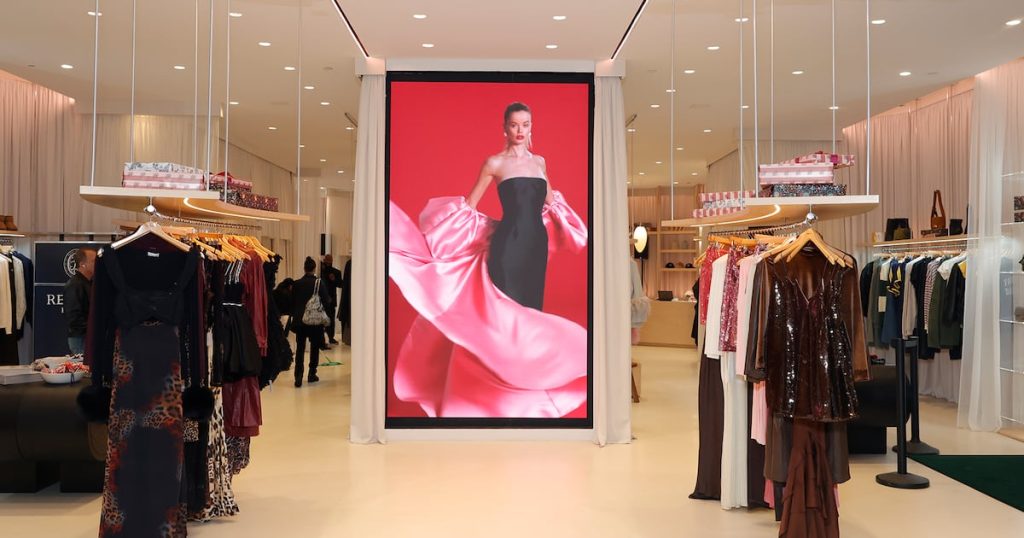Revolve’s presence has long been felt in Los Angeles, but until today it’s been more about soft power: glitzy parties, Coachella domination and serving as the go-to purveyor of the influencer (and wannabe influencer) uniform.
Now, the brick-and-mortar hold-out is laying down real roots with a permanent store set to open in the fall in an 8,000 square foot space in The Grove shopping centre. The move comes after it hosted a pop-up in the same mall this past winter, as well as transitioning a pop-up in ritzy Aspen, Colorado into its first permanent door last year.
Growing brick-and-mortar retail is a big opportunity — and, arguably, a necessity — for Revolve, which has recently pulled back on its influencer-led marketing strategy. Revolve has also seen sales growth turn sluggish after peaking in 2021, with sales slumping nearly 3 percent in 2023 (the e-tailer reports full-year 2024 earnings on Tuesday). The company’s stock price is down 65 percent, from its high in 2021.

Digitally native companies have seen their advantage waning as e-commerce sales have slowed — today, consumers expect brands and retailers to operate across channels. A number of direct-to-consumer stalwarts, including Warby Parker and Glossier, have opened stores in recent years. Beyond a potential profitability play, there’s a lot of value in becoming an IRL retail authority, said Dylan Carden, an analyst at William Blair.
“If you look at this space, the number of companies that can open up stores credibly is few and far between,” said Carden.
Revolve is taking baby steps toward the ultimate goal of operating more stores; this quarter it will look to hire a head of retail. But especially compared to the hyper-specific and wealthy enclave of Aspen, a flagship location in Revolve’s home base of Los Angeles represents another test, according to Michael Mente, Revolve co-founder and co-chief executive.
“If we get these two stores going well, it means in the longterm we can probably open many more stores all over the world … I can see a world where we operate hundreds of stores,” said Mente. “But right now we’re very much in the crawl phase.”
Can Revolve Find its Groove at The Grove?
For now, however, there are no plans to add additional permanent locations, though the company will continue to snatch pop-up opportunities as they come. Instead, Revolve is focused on making its two stores more profitable than its website — only once it hits that milestone will the company assess next steps for expanding its footprint.
“We don’t want to compound a problem and have too many stores with too many mistakes,” said Mente.
Outside lowering return rate and increasing customer acquisition rate, another margin benefit could come from putting a higher percentage of its own brands on the floor, said Mente: Revolve operates over 20 in-house brands, some developed alongside influencers, including model Elsa Hosk’s Helsa.
In store, he said, there’s also an opportunity for more curation, making the shop have a “cool boutique” feel, where shoppers can discover new brands they may have missed on the site, said Mente. Spotlighting emerging brands has always been a big part of the playbook. (The e-tailer even acquired Parisian couture house Alexandre Vauthier in 2024.)
Still, running physical retail comes with new logistical challenges.
Revolve’s success has stemmed from knowing exactly what its young, very online shopper wants. On its site and social media, it highlights relevant themes, including by plugging into events like Coachella and cultural moments like Brat Summer and Barbiecore.
While it can host a broad selection online, stores can only hold so much. Discerning what a particular locations’ customer wants at any given time will be key, a lesson Revolve has already learned in real time, said Mente. In Aspen, for example, Revolve stocked its store with party dresses around New Years, but shoppers actually wanted cozier options.
Mistakes can be costly in a strained retail environment, said Sonia Lapinsky, partner and managing director of fashion retail at consultancy AlixPartners. Though Revolve may be in its test-and-learn phase, shoppers aren’t.
“Consumers are frustrated with the omnichannel experience [right now],” said Lapinsky. “They’re frustrated when they see a product online and can’t find it in store [or] prices aren’t the same online and in-store. Figuring out how to omnichannel right is going to make or break a retailer with different consumers.”
Figuring out how to roll out stores can be a Goldilocks situation, said Carden: too many at once, and you’re overwhelmed and oversaturated, but too few and you don’t reap the benefits — the balance has to be just right.
“We respect the challenge,” said Mente. “It’s a similar business, but it’s also a very different business.”








